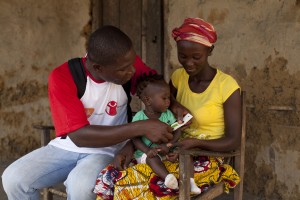The Power Of One Hour – What A Health Worker Can Do In Just 60 Minutes

By Lisa Bonadonna, GlaxoSmithKline
A couple of months ago, we were talking to our colleagues at Save the Children about the incredible work they do to help train frontline health workers in some of the most marginalized communities. We were interested to know what kind of care a health worker can provide in just 60 minutes. Turns out that when it comes to health workers, the power of one hour is remarkable:
- In one hour a trained health worker can deliver a baby and provide the essential care to ensure survival beyond the first critical 24 hours.
- In one hour, a community health worker in Kenya can walk to a household to provide health information to the family, screen children for symptoms such as fever or diarrhea and provide necessary treatment or refer patients to a health facility.
- In one hour, a midwife can see four pregnant women in an antenatal care clinic, providing them with care that will help ensure their survival and that of their baby.
- In one hour, a class of 30 midwives can acquire skills and training supported by Save the Children on emergency obstetric and newborn care, ensuring mothers are given the care they need in the event of delivery complications.

Emmanuel, a Save the Children Community Health Volunteer, undertakes a health check on Patience, 8 months, who is sitting on her mother, Elizabeth's lap. Credit: Martin Webb/Save the Children.
Those few examples are evidence, if more were needed, of just how critical frontline health workers are to enhancing the health and prospects of vulnerable communities. They are also some of the reasons why, as a health care business, GSK is committed to investing in supporting the training and education of health workers – and encouraging others to lend their support too.
Government is integral to swelling the ranks of frontline health workers. Businesses like ours, who are working to improve people’s health regardless of where they live, have a role too in supporting health worker training and can make a big impact. Investing in health systems should – over time – improve access to quality care that helps people keep well. In turn, that can help strengthen these countries’ economic development; after all, countries can only thrive if their populations are healthy.
GSK is working with non-governmental organizations like Save the Children to support the training and education of health workers and help them to reach more families. Since 2009, GSK has reinvested 20% of its profits from the least developed countries back into training health workers in those areas. This is done in partnership with three NGOs who are fellow members of the Frontline Health Workers Coalition – Amref Health Africa, CARE International and Save the Children. So far, more than 40,000 health workers have been trained, reaching 11 million people.
Supporting health workers is also a key part of GSK and Save the Children’s 5-year strategic partnership, through which we are combining our respective resources and expertise with the aim of helping save the lives of one million children. In the Democratic Republic of Congo and Kenya, we have established flagship programs that are training health workers, educating communities and striving to improve access to healthcare for pregnant women, mothers and children. In Bungoma County, Kenya, the program has already trained more than 100 health workers to deliver babies.
Across all of our health worker programs with Save the Children – and other NGOs – we are careful to align our activities with government needs and priorities. Each program is locally managed and underpinned by a three-way partnership. GSK provides funding and our in-country presence can help identify priority areas with governments and NGOs, who provide program delivery expertise and, through their strong regional networks, program efficiencies and economies of scale. Governments, through their ministries of health, ensure training aligns with local health priorities, create an enabling policy environment, and ultimately fund the salaries of health workers who join the public health system.
Not only does this help to ensure the programs are sustainable, but we also hope that by demonstrating the beneficial impacts of investing in frontline health workers, we can encourage greater investment. Already, the effects of putting more resources info health workers are being felt. In our Burkina Faso program area, Save the Children have supported the training of 1,000 health workers and reached over 140,000 children.
And in Mali, as a result of the Save the Children’s advocacy work, for the first time since 2010, nine municipalities have agreed to pay 50% of the salaries of the 72 frontline Community Health Agents in their district in 2015. Results like this give us hope that our training programs are beginning to catalyze support from other quarters. As we head into the brave new world of the Global Goals for Sustainable Development, it will be more important than ever to galvanize cross-sector commitment and resources for swelling the ranks of frontline health workers – who spend every hour of every day helping to protect the health and prospects of their communities.
